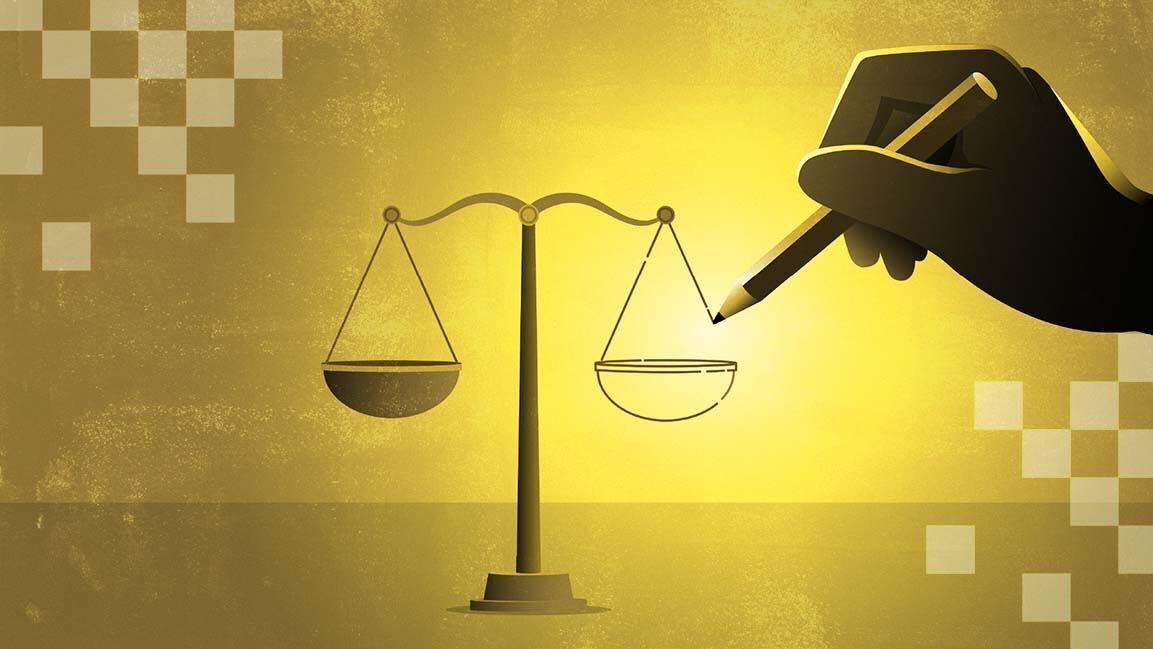These 100 innovations and ideas will shape businesses in the Middle East in 2023
Ministers, CEOs, startup founders, VCs, and futurists offer their predictions on how emerging technologies and ideas will disrupt businesses in 2023.

Even as most of the world talks about disruption in terms of the now—mobility, blockchain, connectivity— businesses are focused on the emerging innovations that will shape what's next to will help them gain a competitive edge.
We talked to ministers, C-suite executives, futurists, and technologists dominating today's business in the Middle East – from enterprise tech, ICT, and cybersecurity to retail, food, and fintech, asking them the top innovation disrupting the industry they are in and how businesses should prepare themselves.
They told us how technologies such as automation, edge computing, open API, extended reality, and low code/no code, among many others, are disrupting innovation-driven industries. And why businesses need to optimize costs, build workforce competencies, and focus on the dynamics of a digital-first world to lead with authenticity, empathy, and purpose.
*Fast Company Middle East compiled these responses, which have been lightly edited and pared down for length.
01
H.E. Huda Al Hashimi
Deputy Minister of Cabinet Affairs for Strategic Affairs, United Arab Emirates
In the "new normal” we will look at technological advances from the lens of how they can make relationships between government and citizens more effectively. With this in mind, I want to single out three trends worth keeping an eye on. Governments can no longer ignore the cryptocurrency space; we have to make sure that regulations are put in place that promote economic opportunities for businesses while preserving citizens' security and privacy.
While much of the attention is around generative AI, there are potential challenges they are introducing for regulation, and we are about to see an explosion in the applications of these tools to aid key tasks of planners and policymakers. Imagine, for example, a local government and citizens picking from an infinite variety of options for the design of a street as produced through AI.
I have been watching the space of rules-as-code: translating government regulations from paper to code to become machine-readable. For example, easier calculation of social benefits for citizens. Gone are the days of sifting through endless documents to understand the implications of a new benefits regime and its various rules and exceptions – a digital interface enabled by the underlying code can now make this a much more streamlined process.
02
H.E. Khalfan Belhoul
CEO of Dubai Future Foundation
Innovation is at the heart of economic sectors and is the ultimate catalyst for progression across industries and the public sector. But for innovation, there first needs to be research and development, especially in technology-intensive fields, which constitute most of Dubai's strategic sectors.
Dubai Future Foundation aims to become a global platform for facilitating knowledge exchange and leading R&D efforts while serving as a think tank that informs decision-making in our futuristic government. Building human capital as the cornerstone of development is at the core of the foundation's mandate and is a key pillar of the R&D ecosystem we are building here.
Dubai has made great strides in carving a path towards a more innovative future, powered not only by digital technologies, such as AI, autonomous vehicles, and blockchain but also, crucially, by science and technology research. I urge businesses to constantly look for new opportunities, which can be facilitated by analyzing global trends and industry insights.
03
K D Adamson
Futurist and Ecocentrist
ESG is a window to the future for global business. As the metrics by which we judge companies change, their leadership, culture, and license to operate are under strain, and so are their profits. Stakeholder expectations are changing, but not uniformly, and this fragmentation will have major impacts, particularly for multinationals.
We are shifting from globalization to nobleization, where companies are under increasing pressure to take ethical stances and only do business with nations and other companies that share their moral and ethical values. This "moralshoring" across digital and physical infrastructure, supply, and value chains could have huge implications, fundamentally altering how the business operates. Hard choices are looming where the future of profit may be purpose.
We must reimagine competition, recalibrate value, reboot digital transformation, and redefine innovation. We must do it as part of new, generative, multi-stakeholder ecosystems based on radical transparency. The future for business lies at the nexus of the green, blue and circular economies, which is going to require massively more and different data, advanced technologies, and collaborative platforms to capture and share it.
04
Joseph Bradley
CEO of Tonomus
Technology should enhance the human experience rather than replace it. We expect more businesses to follow our lead in adopting a human-centric approach as they strive to innovate in this world-changing digital transformation era.
The world's understanding of the metaverse will evolve in closer alignment with our vision – as a link between physical and digital worlds that combine into a single, seamless experience. As technology becomes more prevalent and powerful, embracing our unique human characteristics will be the most valuable skill organizations need.
To optimize potential, diversity and inclusivity will play a key role. No matter how advanced technology becomes, humans will continue to play a critical role. When I think of a breakthrough innovation, it's not technology, it’s humans.
05
Thierry Antinori
Chief Commercial Officer, Qatar Airways
Immersive brand experiences, combining various technologies such as augmented reality, virtual reality, mixed reality, artificial intelligence, and virtual assistance, will transport users into a new or altered reality.
Such experiences are valuable for two reasons: they build an emotional connection with customers beyond the typical touchpoints and positively influence their perception of the brand. Both factors make customers much more likely to purchase a brand's products in the future.
Businesses can prepare for the future by identifying opportunities and adapting to challenges. Qatar Airways places great importance on innovative and resilient business growth.
05
Aamer Sheikh
CEO, PepsiCo Middle East
We'll start seeing more and stronger collaboration between start-ups and multinationals and unlocking non-traditional partnerships. Connecting multinational actors with disruptive players can empower stakeholders across the value chain to create systems and positive incentives that drive real change.
A renewed emphasis on sustainability, inflation and supply chain security, and talent development will be vital. With the region hosting both COP27 and COP28, businesses will have to build their environmental credentials as governments, and consumers hone in on responsible, purpose-driven brands to define preferences and drive growth. More businesses will need to place their ESG processes at the core of their strategy.
06
Mohammed Amin
Senior Vice-President – META, Dell Technologies
In 2023, organizations will need to manage increasingly complex data and tasks. To address this, we foresee the Edge being the backyard with the proliferation of data. It stands to assist organizations with the data deluge, provide the massive untapped potential for businesses, and capture new sources of revenue. Cybersecurity and resilience will remain key for businesses.
Many CEOs and CIOs are taking bold steps to create the right balance between their traditional business and their digital future, to capture new sources of revenue and react to rapidly changing market conditions.
Looking ahead, businesses must look at people, technology, and processes to succeed. Undoubtedly, the dynamics of a digital-first world will require businesses to lead with authenticity, empathy, and purpose.
07
Laurent Duffier
Managing Director of L'Oréal Middle East
Today's consumer is looking for personalized beauty advice, unique experiences, and products that are true to their values, such as authenticity and sustainability.
This can be implemented by leveraging new technologies like AI and AR and developing data-driven strategies to deliver the best human-centric services and products that meet the consumers' ever-changing needs.
COP28 will contribute to accelerating the sustainability agenda in the region. To stay ahead of the curve in this fast-changing environment, using the power of technology and green sciences to deliver bespoke products and experiences that are efficient, safe, and respect the environment is crucial. This is our ambitious L'Oréal for the Future 2030 program.
08
Chafic Traboulsi
Vice President and Head of Networks at Ericsson Middle East & Africa
Encompassing everything from virtual reality (VR) to mixed reality (MR) to augmented reality (AR) and haptics, extended reality has enormous potential to transform both industry and society. In 2023, we can expect 5G’s time-critical communication capabilities to enable major breakthroughs in a wide range of application areas of extended reality.
Enterprises must view 5G as an innovation platform rather than a connectivity network and as an integrated part of their digital transformation processes. In the coming year, businesses must ask how they can leverage 5G to shrink distances, lead times, and response times to unlock disruptive business improvements.
Enterprises must also define the target spectrum matching their needs as gaining clarity on the target spectrum adds focus to the early deployments for tying together network, device, and use case strategies.
09
Helmut von Struve
CEO of Siemens Middle East
One of the more promising technologies that almost every industry can benefit from is digital twins. This technology allows us to reach new levels of productivity and sustainability, changing how we live.
Using the data generated from our infrastructure, cities can optimize themselves and become more efficient and livable daily. When applied to mobility, train lines operate with fewer delays and better customer satisfaction. And factories can be optimized virtually, leading to tremendous capacity and productivity increases.
The business environment will be more uncertain in 2023. Businesses must adapt to this environment, yet they must also continue to address the most pressing issue facing humanity: climate change. With COP28 coming up in the UAE, 2023 will be a catalyst for companies, governments, and people in the Middle to embrace sustainable growth and leverage the technologies that will have a positive and sustainable impact on our planet.
10
Beverly Rider
CEO of Tonomus Venture Studio
The growing demand for digital innovation will embolden entrepreneurs to bring their ideas to life, as we work to provide them with multicultural platforms and solutions for knowledge exchange. Increasing access to pioneering technology will enable businesses and entrepreneurs to truly dream big. Even the sky is no longer the limit. We will see greater ambition and determination in the new year.
The next generation is already in the metaverse. There will be entirely new industries that have yet to make their grand entrance. When they are ready to do so, we will welcome them with open arms.
11
Dr. Ray O. Johnson
CEO, Technology Innovation Institute and ASPIRE
AI will continue to be a dominant disruptive force across all sectors. So much so that at the Technology Innovation Institute, we created the AI Cross Center Unit (AICCU) to support all 10 of our research centers exploring from autonomous robotics to natural language processing (NLP).
Prepare for disruption, think about being disrupted, and look to disrupt yourself. Reskilling and up-skilling talent across the business to prepare for an evolving future is a corporate strategy that will ensure companies not only survive but they will thrive in the future.
12
Khuloud Al Nuwais
Chief Sustainability Officer, Emirates Foundation
A holistic and structured approach to drive systemic changes across the food value chain, using innovation and technology to enhance processes, aiming to achieve a circular economy through collaborative efforts and measurable results.
It’s important that businesses, governments, and individuals work continuously together to build resilience and build capabilities to be more agile and resilient. Also, making better use of technology and innovation for better business continuity and sustainable development.
13
Khaled Al Huraimel
Group CEO of Beeah Group
We are increasingly seeing digitalization and sustainability impacting industries across the region. Organizations are under pressure to transform legacy systems through digital initiatives that improve efficiency and productivity while reducing their carbon footprints and impact on the natural environment.
The UAE is creating an environment where companies that implement advanced 4IR technologies can thrive. We are promoting sustainability across industries. Digitalization is a key pillar in our strategy, and we are diversifying our businesses to be more holistic in our approach to sustainability.
My advice would be for businesses to adopt agile methods, implement future-ready systems and create a workplace environment where people can thrive and innovate. This will be crucial to meet universally important sustainability targets and achieve business resilience in a dynamic economic environment.
14
Jonathan Mepsted
Vice President, Middle East & Africa, Netskope
A significant disruption comes from the "industrial metaverse”. We will see wider recognition that the key components of the industrial metaverse –- the digital shop floor (used interchangeably as a digital twin) –- in combination with supply chain automation and optimization through AI/ML models, are real and relevant, bringing new cybersecurity challenges.
And with this new attitude toward the industrial metaverse comes the opportunity to drive a deep technological shift as a business change initiative.
Prepare to protect against the evolving threat landscape. In 2023, boards will want more data-driven, quantified plans for risk reduction. The challenge will be for CISOs to demonstrate that they are getting the biggest risk buy down for every dollar they spend. Arbitrary metrics and qualitative assessments will not be enough. As a result, there will be more of a focus on empirical evidence driven by data.
15
Joe Dunleavy
Head of Innovation of Endava
Digital transformation has often failed to enable organizations to create resilience. This is where an ongoing iterative and dynamic digital acceleration process comes into play. Companies are considering their usage of digital technologies as an ongoing, continuous process that is best described as "digital acceleration" rather than a one-and-done transformation process.
Companies must implement long-term strategies. There is no digital end state, only dynamic and continuous transformation. Those who accept this digital acceleration strategy should be able to upgrade their digital properties on an ongoing basis swiftly. Those who do not risk falling behind speedier, more digitally aware competitors.
16
Majed Al Mansoori
Deputy Executive Director at the Museum of the Future
We already deploy solutions such as AI and are even working towards implementing IoT to enhance our exhibitions by immersing visitors in an exceptional journey of future exploration. These kinds of technologies will become more prevalent in such institutions as they are excellent innovative tools that allow them to educate and engage visitors in the overall experience.
They enable institutions such as museums to completely transform experiences and allow them to achieve their main objective, which in our case, is to inspire and empower people to build the future they want to inhabit.
In 2023, businesses must prepare to become adopters and pioneers of emerging technologies. Embracing disruptive trends will help companies gain a distinct advantage as sectors evolve. We are already seeing businesses in Dubai leading the way in adopting disruptive models and new technologies. Additionally, businesses must use all the tools to implement ESG strategies effectively, especially technology to enable simulations, measuring, and reporting.
17
Remo Giovanni Abbondandolo
VP of Commercial, MENA at Checkout.com
Consumer appetite for digital payments will continue to rise. In the MENA region, the role of the marketplace in giving local and small businesses access to the digital economy will be increasingly powerful and important.
As the lifeblood of any consumer business, payments present an enormous opportunity to maximize revenue growth. This can be as simple as unlocking new payment methods to meet evolving consumer preferences such as BNPL or digital wallets to optimize the checkout process, utilize AI to guard against fraud, and empower businesses to drive up conversion and authorization rates.
18
Jake Thomas
Head of UAE at Snap Inc.
Today, many businesses are beginning to recognize the opportunity in AR to develop new revenue streams, expand existing ones and increase interaction with consumers.
Having closer engagement with consumers is no longer optional but a requirement for business survival. Businesses today should invest in technologies such as AR, which provides them with a medium to offer consumers refreshed experiences, cater to their evolving needs, and impact their business growth.
19
Mohammad A. Baker
Deputy Chairman and CEO, GMG
The hybrid retail environment allows customers to touch and feel the product in-store and purchase it in-store or online, so the shop inventory no longer limits them. Improved access to advanced AI tools to mine rich insights from consumer data hyper-personalizes CX.
The global supply chain issue remains unresolved, while inflation will curtail consumer spending across the region in 2023.
Therefore, retailers will need to keep strengthening their supply chains. Sustainability will be a central theme in 2023. Efforts like greening the supply chain and choosing sustainable products allow retailers to align with customer demand and national green commitments.
20
Suresh Vaidhyanathan
Group CEO, Ghassan Aboud Group
The emerging connectivity potential with 5G/6G technology is massive and will become a key driver for growth. This will also likely lead to the emergence of applications in the virtual reality space to enhance customer experience.
We expect mobility tech to make rapid strides, creating further disruption to conventional models. Using data and technology to manage waste, mitigate food shortage and overall carbon footprint will be key focus areas in the coming year.
Businesses must optimize costs, build workforce competencies and leverage technologies for gaining competitive edge in the market. The regional market is likely to undergo more consolidation and create growth opportunities for better prepared players.
21
Chaitanya Peddi
Co-Founder of Darwinbox
The focus continues on employee experience (EX). Organizations are looking at a Human Resource Management Software (HRMS) that's not just intuitive and mobile-first for the region's young workforce but is embedded in the flow of work. This includes AI-based personalization and integrations (super app) that enrich EX.
The future workplace necessitates businesses to not only accelerate their HR digital transformation by adopting employee-first digital processes and technologies but mandates leaders to prioritize data-driven decision-making – for their talent or business, in general.
22
Fred Lherault
CTO EMEA and Emerging Markets, Pure Storage
Historically, large enterprises have worked with different cloud providers for different use cases, which creates cloud lock-in. In 2023, we will see an increase in customers building cloud neutrality into their design to avoid this lock-in. To do so, companies will rely heavily on containerizing applications, making them portable across private, public, and hybrid cloud infrastructure, regardless of the cloud providers at play.
There will also be a push to consolidate the management of applications through Kubernetes platforms with all the flexibility, speed, cost-effectiveness, and security needed to ensure success in a cloud-neutral environment.
Every organization is struggling to find kubernetes, data analytics, and machine learning specialists, as these are some of the most in-demand skills in IT at the moment. In 2023, organizations will need to hire more generalists and fewer specialists, even in critical roles, and train them in areas where skills need to be developed. This will be far more efficient for the IT organization in the long run.
23
Sid Bhatia
Regional Vice President & General Manager for Middle East & Turkey, Dataiku
Low code/no code is a big disruptor. Empowering business specialists with out-of-the-box solutions-building capabilities is a trend gathering steam, and quantifiably so. One estimate predicts a CAGR of 27.9% between now and 2026 for the worldwide low-code development platform market. Offerings are showing significant evolution to cater to a range of workflows, and AI is becoming more and more common among low-code orchestrations.
The region suffers from skills gaps in technology fields. While many government initiatives have been devised to solve this problem, many may take years to bear fruit. In the here and now, enterprises that want to build an Everyday AI culture can look to their talent pool.
The challenge is driving the AI program forward while delivering an employee experience that can attract and retain the right skills to make it happen. One way of doing this is to appoint citizen developers — non-technical staff who build AI solutions using low-code platforms.
24
Fleming Shi
CTO, Barracuda
Throughout 2022, the major ransomware gangs were behind blockbuster attacks, keeping them in the headlines. In 2023, with the ransomware-as-a-service business model taking off and the recent build leak of LockBit 3.0, a new generation of smaller and smarter gangs will steal their limelight.
During the year, organizations will experience an increased frequency of ransomware attacks with new tactics, and those that aren't prepared will make headlines that devastate their business and reputation.
As ransomware and other cyber threats continue to evolve, the need for adequate security solutions has never been greater.
It is essential for security providers to create products that are easy to use and implement, regardless of a company's size. Additionally, sophisticated security technologies should be available as services so businesses of all sizes can protect themselves against these ever-changing threats.
25
Dinesh Varadharajan
Chief Product Officer, Kissflow
There's a monumental shift in the mindset towards enterprise application development. While low code/no code is the first choice for IT leaders to build and release applications at scale, these solutions remain primarily owned and driven by IT teams. This worked so long as digital transformation focused on superior customer experience and core business. However, now, businesses recognize more is needed. They must also transform the operations and processes supporting the core business and its customers.
Businesses have been focusing largely on customer experience transformation. However, many of these initiatives aren't reaping the expected results, largely due to a lack of focus on the operational transformation that connects the customers and core business. In the year ahead, organizations should focus on operational transformation initiatives. Moreover, businesses have also invested heavily in adopting many software solutions, which has fragmented enterprise users. They should now revisit their tech stack to have a unified user experience.
scroll down to view more
scroll down to view more
scroll down to view more
scroll down to view more
scroll down to view more
26
Kareem Monem
Regional Managing Director MENA, Valtech
The biggest and most transformational trend we see is composable commerce. With the rapid cloud adoption, it will soon become the default target architecture for many organizations. Build a composable tech stack to adapt to the changing needs of your customers.
As you're not financially tied to a monolithic tech stack that forces you to behave as it intends, you can constantly reconfigure according to your customer's needs and expectations – and even potentially lower your TCO. It provides unrivaled flexibility and scalability.
Companies must invest in upskilling the workforce, providing a flexible working environment, and embracing AI and automation. If they can now build all of these on a client-centric model of success, with multi-level, multi-channel, and personalized, digitally enabled experiences, they will emerge stronger. Companies will also need to take the lead in reducing their environmental impact.
27
Morey Haber
Chief Security Officer, BeyondTrust
In 2023, we will see a rise in ransom-vaporware—extortion based purely on the threat of publicizing a fictional breach. Society willingly accepts the veracity of breaches reported in the news without evidence.For a threat actor, this could mean the need to perpetrate an actual breach is reduced, and a threat alone, that is not even verifiable, becomes an attack vector all in itself. Any claims from the organization that the breach didn't happen will be deemed an attempt by the organization to avoid reputational impact, even if the claims are baseless.
The publishing of any data, however easily obtained, will be seen as proof of a breach, including simple information obtained via open-source intelligence (OSINT). This is especially true when a named threat actor claims responsibility. It's the ultimate, undefendable attack for 2023.
In 2023, businesses should prepare for the next-gen attacks by "going back to the basics." While there have been many new cyber security solutions to protect the cloud and remote workers, attacks still prey on security basics. These include asset, vulnerability, configuration, patch, identity, and privilege management flaws. If organizations can double down on performing these disciplines well, then many attacks can be mitigated by simple cyber security basics.
28
Amr Refaat
CEO of Gulf Business Machines
We will see a further emphasis on employing sustainable technologies, with the AI spectrum being by far the most promising sustainable technology innovation when employed in association with other technologies such as IoT.
Through intelligent automation, whether in utility services, oil and gas, transport networks, or other sectors, we will be able to witness massive benefits in minimizing energy expenditures, while also giving business leaders deeper insight into their operational performance. Cloud and AI will increasingly continue to support innovation and disruption within industries.
Businesses who are not accelerating digital transformation are already falling behind as we witness technology become the cornerstone of a company’s operations. As such, conversations in the boardroom should increasingly focus on how emerging technology can be employed to accelerate business operations and to drive progress and impact.
29
Antonio Pietri
President and CEO of AspenTech
Automation and digitalization play an increasingly important role in efforts to meet sustainability goals, allowing firms to increase efficiency by optimizing the use of key resources and minimizing carbon emissions.
How should businesses prepare themselves: New digitalization strategies will help companies accelerate their transformation and ensure long-term business resilience during volatile periods.
Companies that take effective action to boost the efficiency of today's assets and plan effectively for future technologies will prosper as their assets run safer, greener, longer, and faster.
30
Aloki Batra
CEO, FIVE Hospitality
Next-gen build tech or infrastructural innovation will redefine and re-energize global society to achieve climate goals. From architectural consciousness to smart connectivity and eco-amenities that do not compromise on customer experience will spark sustainability-first applications for previously unimagined possibilities. Luxury living will be disrupted.
Businesses must act as agents of innovation. The more businesses accept and align with the win-win reality of sustainability and business success, the greater the frequency of sparking ground-breaking ideas and implementing solutions that uplift the world.
31
Khaled Al Melhi
CEO at CPX
In the region, we are seeing the public and private sectors make a concerted effort toward embracing Web 3.0. These include adopting emerging technologies such as metaverse, AI, and blockchain to maintain their competitive advantage.
While these innovations have the potential to create new growth opportunities and connect the world like never before, it does come with increased risks. Businesses are now exposed to new and sophisticated cyber threats. As more data and workloads go digital, the likelihood of cyberattacks will increase.
Today, every business is in the cybersecurity business, and organizations must understand that if they do not act proactively, it is only a matter of time before a cyberattack happens. Organizational security awareness is what businesses should look into.
31
Saad Toma
General Manager, IBM Middle East and Africa
As organizations move further into their hybrid and multi-cloud journeys, they have also started taking inventory of their IT environments to select which workloads and applications are best suited for the cloud and which should remain on-premises. In the coming year, we believe more organizations will realize it’s not mainframe or cloud; it's mainframe and cloud.
In 2023, we will see more organizations explore how hybrid cloud can play a key role in advancing their sustainability objectives. Business leaders are set to place a larger focus on improving energy efficiency across their entire IT operations without sacrificing security or performance.
Without the right talent, organizations cannot get very far. In the year ahead, there must be a laser focus on developing the type of cloud talent needed to execute a robust hybrid cloud strategy while leaning into the expertise of ecosystem partners.
32
Reda Raad
CEO, TBWA/RAAD
As on/off-line blur, it will become increasingly difficult to distinguish where the real world ends, and the metaverse begins. Also, co-creating with machines will be a huge theme next year. In 2023, the creator economy will continue to rise and expand. As new platforms emerge, creators will have richer media to work with--from games, interactive art exhibits, and fashion shows to immersive online concerts and sports events.
We all have a role to play in the push toward a healthier tech-human balance. However, the real changemakers will be the businesses behind the technologies we use every day.
Every company asking us to download their app, check out their website, play their interactive game, or watch their latest ad must ensure that ethics guide the way forward. But to achieve this better balance, we'll first need to toss out the idea that progress means more tech at all costs.
33
Nicholas McQuir
Director of Product Management, Strategic Missions and Technologies, Microsoft
Today, technology focuses on three core trends: ubiquitous computing, AI, and immersive experiences. However, the future disruptions will bring significant evolutions to these three areas thanks to emerging technologies 5G and space, AI and quantum at scale, and human and machine co-reasoning.
5G will expand the cloud further, putting ubiquitous computing into increasingly hard-to-reach areas and creating a new paradigm for connected applications. AI and quantum computing at scale will create a new computing paradigm with greater precision, speed, and scale applied to computational-based problem-solving that will open new doors in scientific discovery.
And underpinned by these disruptions, we'll see a new co-reasoning paradigm develop between humans and machines that will transform how we interact with technology from the immersive, extended reality-based experiences we see today.
34
Christine Gould
CEO of Thought For Food
Decentralization is a trend that has been gaining momentum, which will positively disrupt the food and agriculture industry so that we can feed 10 billion on a hotter planet. This sector is currently entrenched and filled with inertia -- but food, energy, and fertilizer shortages have catalyzed renewed interest everywhere in innovating for national food security.
Having more countries focused on bolstering their agricultural production instead of relying on imports or a few megacorporations to lead the way builds resilience to external shocks. This is a new world where agri-food-tech innovation is more localized and distributed, and solutions will come from the people who need them most.
Businesses can embrace the shift to decentralization as an opportunity. Exciting new technologies and business models will allow businesses to thrive in this new paradigm. For example, open innovation strategies can be turbocharged by using smart contracts to share and ensure the fair use of IP. ReFi (regenerative finance) can direct resources to regions and solutions currently under-ventured.
35
Erika Doyle
Founder of Drink Dry
The biggest innovation we have recently seen was our partnership with Amazon Alexa to give the consumer a real-time, white-glove bar service of non-alcoholic drinks when you're in the mood from the comfort of your home.
In 2023 businesses need to think outside the box and focus on offering “value added" to their consumers. The world of e-commerce is challenging, and everyone's bottom lines are affected by ever-increasing consumer acquisition costs. We need to learn to pivot to make it work going forward.
36
Justin Peyton
Chief Transformation Officer, Wunderman Thompson APAC
The world is faced with many huge challenges ranging from global warming to population growth, caring for the elderly, and many more. The solutions to these problems are unlikely to come from a singular idea but rather from people working together and building on ideas.
Blockchain technology and its ability to reimagine reward and attribution structures through quadratic funding and other regenerative funding and governance strategies is likely to become a huge catalyst for innovation with the potential not so much to disrupt business or industry but to accelerate the ideas poised to have the biggest impact.
Using new technologies is more about the investment in people learning to integrate them into their regular operations. Having a group focus on understanding how the companies in Web3 space involve the community in their decision-making process and how DAOs manage governance will provide a platform for the future of larger industry innovation and reward structures.
37
Ryan Lefers
Co-founder and CEO of Red Sea Farms
In 2023, prices, supply, climate effects, insolvencies and M&A, regulatory oversight, and import/export routes will all be front of mind in the food sector. Middle Eastern growers such as Turkey, UAE, Oman, Jordan and Morocco will replace some of Europe's supply.
As 2023 will likely be very hot -- again, fueling drought, crop damage, and reducing yields -- agritechs providing cost-effective/low-water solutions will increase. Investors will turn more to plant science companies to address heat and reduced fertilizer supplies, and those companies' valuations will increase. More than ever, sustainable food growth will be crucial.
We expect businesses to control costs tightly and reassess business models to ensure sustainability. In tougher global economic times, relationships will be key. On the one hand, customers need to be kept happier than ever. On the corporate side, partnerships and scale will be important in the food sector, and we will likely see increased M&A.
38
Abdulaziz Al-Assaf
CEO of Zuhair Fayez Partnership Consultants
Industry and academia are jointly working to adopt the newest technologies and methodologies in design and construction. With the objective of revolutionizing the design effort, the possibilities and the benefits of adopting the approach of digital twins is now widely discussed.
Also, the 3D construction printing (3DCP) technology is leveraged to accelerate the construction process.
39
Dr. Lamya Abdulaziz AlOmair
Head, AI & Bioinformatics, KAIMRC
The next big innovation will come from merging machine learning and AI, complementary technologies. The algorithm should support (re)trainable and (re)composable models of computation and enable appropriate levels of abstraction-leveled reasoning and interaction about these models.
Research should be undertaken in various fields and disciplines to make breakthroughs. Metaverse is another big jump in technology. Merging AI and metaverse can produce breakthrough results to drive the next phase of innovation in manufacturing, retail, healthcare, and smart cities.
Talking about business preparation, we must remember the milestones and obstacles we consistently face. Hence, leaders should retain humanity, modesty, positive thinking, and flexibility to achieve this goal. In addition to that, companies must be designed to acquire talent. By laying out expectations and the output that teams must create more explicitly, employers can help reframe how people think about productivity.
40
Vriko Yu
Co-Founder and CEO, Archireef
The innovation in our space will be understanding biodiversity impact faster by leveraging cutting-edge data collection and data processing methodologies, ultimately enabling the quantification of biodiversity impact.
Businesses should be wary of fiscal challenges during 2023, and a focus on better efficiencies should take center stage. These could be achieved through a stronger focus on sustainability. For example, by betting on a more sustainable supply chain, most companies will create arguably unexpected efficiencies on all fronts.
41
Sara Chemmaa
CEO of Citron
We are in an innovation-driven industry, products must suit the consumers' needs, and the winners are the ones that can innovate fast. We will continue seeing more innovative products in the kids and baby category, and that technology-enabled products will continue to grow their market share.
In 2023, we will see products have multiple functions, aiming to reduce hyperconsumption and be more environmentally friendly and sustainable.
In our line of business, investment in R&D is key, and this year we have invested heavily to try to stay ahead of the curve, creating products that will be able to respond to the growing complex demand of the consumers. The market for consumer goods remains very competitive. Businesses should be prepared to invest in innovation and not only focus on "replicas”.
42
Richard Fitzgerald
CEO and Founder of Augustus Media
AI-generated content will disrupt the media industry. The initial focus will be on articles, and text-based publications, then move to video and other formats. It will enhance the digital media ecosystem. New suppliers, software, and new skills will be needed.
Companies will have content AI teams like they had SEO and video and social media departments. Also, it won't be a home run; the search engines and social media algorithms will have their ranking system to identify AI-generated content.
Be alert for macro and microeconomic factors. Smart planning – focus on your own business and products and continue to create offerings that suit where this region is going.
43
Leyla Azizova
Co-Founder and Head of MENA for WEMA Health
Remote care saw a huge increase during COVID-19 when patients became more comfortable with the idea of consuming healthcare services from home and consulting their healthcare providers via telemedicine. I believe remote care will increase more in significance and become more and more the norm of many healthcare services. This opens the door for many innovative business models using virtual healthcare.
2023 will present a challenging economic climate with an increasing cost of capital, so I believe businesses should prepare themselves by being more cost-conscious and bottom-line driven. This is especially important for young companies and startups.
Unlike in the past couple of years, most startups cannot depend on a constant stream of external capital anymore and need to be self-sustainable from the beginning.
44
Musfique Ahmed
Co-Founder, SmartCrowd
Technology innovation in blockchain, tokenization, NFTs, and resultant Decentralised Finance (Defi) services has the prospect of disrupting real estate and other private asset investing by creating efficient and deep public markets. It especially promises to solve several limitations in the current real estate investing models, such as REITs, public and private open/closed-ended funds, and even crowdfunding models.
The exciting prospect is the potential for various Defi services that can be built on top of the tradeable real estate tokens, potentially unlocking further value for investors from the underlying real estate assets.
Businesses must be prepared to face many challenges where capital is hard to come by. Rising commodity prices due to geopolitical tensions, global supply chain disruptions, and costly borrowing due to higher interest rates can seriously affect operations.Investing in innovation, technology and talent will also help businesses take advantage of any economic upturns that come their way.
45
Dr Sonia Jaafar
CEO, Abdulla Al Ghurair Foundation for Education
The talent challenge will likely bring about some disruption across all businesses and industries in the upcoming years. Exacerbated by the pandemic, we have seen a significant acceleration of digital transformation these years, leading to more workplace automation.
This creates huge implications for the skills and talent businesses require for the future and will cause shifting talent pools and reskilling and upskilling in most organizations. So ongoing learning opportunities to grow and progress should be essential to any organization's offering in 2023.
Business leaders must prepare their organizations and people for the changing nature of work. Organizations that rethink, reshape, and reinvent themselves and their talent will be best placed for a resilient and sustainable future. When an organization ensures that its talent is ready with the knowledge, skills, and attitudes to adapt and deliver, technology and any challenges that come with it are less of a disruption and more of a catalyst for success.
46
Josiane Sadaka
CEO of Blue Carbon
2023 will see several industries and organizations believing more in the power of blue and green economy operational frameworks. 2023 will also see organizations increasingly moving towards carbon credits, known as carbon offsets, and increasing governments' interest in the ecosystems' environmental potential as they work towards complying with the existing regulations.
It is incredibly exciting how blue is emerging as the new green as far as global sustainability is concerned. Combining environmental insights with real-world improvements should be the goal for businesses and governments.
Blue carbon should be incorporated into the sustainability kit of organizations, be they public or private, and it should become a crucial element of their strategies.
47
Prasad Ramakrishnan
CIO of Freshworks
Companies will deploy more bot workers in 2023 to reduce human dependence on mundane tasks. It'll also reduce cost and margin for human error. We can also expect the next wave of automation to fill the IT skills gap.
AI engines will write code. As low-code/no-code platforms continue to enable the technology behind these innovations, we'll see more maturity, more time savings, fewer errors, and faster development.
We can expect creative sales offers to secure longer-term contracts, but buyers, beware. Review and reevaluate your contracts on any subscriptions often to ensure you still need them. Being mindful of what you are subscribed to gives organizations more flexibility regarding renewal time and stops you from buying more than you need.
48
Robert M. Lee
CEO and Co-Founder, Dragos
At a macro level, one of the biggest trends in the industry is digitization and the associated hyper-connectivity of industrial environments. With digitization and hyper-connectivity, we have moved from heterogeneous to homogeneous infrastructures. This allows for a more equitable system wherein we can attract talent from around the world, take advantage of modern technologies, and ultimately make our systems more productive.
But it also creates more risk. Adversaries were previously more limited by having to create extraordinarily boutique OT cyber attacks for specific organizations. Now they can also create threats that can be more broadly employed against a range of organizations.
For industrial companies, executives need to align on what OT risk scenarios they want to focus on. Executives should consider what kind of events they want to prepare for as a company. Is it ransomware that impacts the OT networks and attacks safety systems? Once that is done, the security staff can carry out their jobs effectively and advise on the best approach and security systems needed to mitigate those risks.
49
Soham Shah
CEO of Selfdrive.ae
In 2023, the car rental industry is expected to change in several ways. Several EV models are now available, from small city cars to larger family vehicles. And as technology develops, EVs will only become more popular. Many car rental companies are already starting to add EVs to their fleets, so this will likely be a major trend in the industry over the next few years.
Subscription-based car rental services are one of the industry's fastest-growing trends, as they offer a more convenient and flexible way to rent cars.
50
Sundaram Lakshmanan
CTO, Lookout
Specialized point products will become the Achilles' heel of enterprise security. As data, devices, and users become more interconnected, IT and security teams need to consolidate their security solutions to avoid the complexities of securing data with multiple tools. The platform approach will help ensure that all data -- whether in the cloud, on-prem, or a private app – is protected under uniform data security policies.
The secure services edge market is proving that a combination of cloud access security broker, zero-trust network access, and secure web gateway in a single platform is the most forward-looking approach to securing remote workers and protecting data across the modern enterprise infrastructure.
We expect targeted attacks to be much more personal in the coming year. Already, we see attackers steering away from targeting official work emails to trap their victims. There is currently very little tech coverage to give visibility into what's happening to enterprise data and little control over this surface (which is easiest to exploit). As a result, user error and account compromises will become more pronounced.
scroll down to view more
scroll down to view more
scroll down to view more
scroll down to view more
scroll down to view more
scroll down to view more
51
Uday Shankar Kizhepat
Vice President and General Manager- Middle East and Africa Region, WSO2
An API-first strategy will become necessary for accelerating innovation in the year ahead. Application programming interfaces (APIs) allow innovation to hit a pace that individual organizations cannot reach on their own. Developing API capabilities early in the cloud migration process makes it easier for organizations to develop or adopt new applications across more of their services as migration continues.
I also expect the emergence of trends toward consumer digital consent management. Any organization that holds personal information on its customers must adopt a culture that confers appropriate ownership rights on those customers.
We are poised for success if we adopt the right digital strategy and investments. Leaders across all functions now need to pay attention to tech trends, and their involvement will help steer the right investments that will ultimately reap the rewards for the entire organization.
52
Walid Saad
CEO & Cofounder, World of Farming
One of the top tech trends for the agritech sector is AI. AI integration into the agritech space will provide efficiencies in controlled environment agriculture that will catalyze its growth.
In vertical farming applications, AI-driven solutions will facilitate farm management automation, crop cycle optimization, disease detection, and water and energy efficiencies. The result is an enhancement in the economic viability of vertical farming and accelerated deployment of smart vertical farming systems.
Like many sectors, the agritech sector will face a challenging 2023 with rising production costs and high inflation rates. However, companies can best prepare by focusing on optimizing internal efficiencies. For example, at World of Farming, we put our efforts into crops that provide optimal gains to drive profitability and help provide stability amid prevailing economic conditions.
53
Nimish Shah
Vice President, CE Creates
There are three major disruptions. Repetitive work will be automated, in some cases, AI will be capable of completing previously intractable tasks; there will be innovative models that will solve financial exclusion, which will also build the basis of digitization across healthcare and education, and our energy will become more sustainable.
Frugality is the quality every business needs to adopt in the current global macroeconomic scenario. Businesses need to forecast more accurately and have the agility to reduce spending inefficiencies. This will also filter out a lot of businesses that still need to be built on strong economic and product fundamentals.
Businesses must focus on process efficiencies, increased automation, and digitization to reduce manual overheads. In 2023, we will see a shift in the mindset of "growth at all costs" as investors focus on revenue retention, core unit economics, and technology.
54
Dalia Lachine
CEO & Co-founder, BreakBread
In 2023, technology will continue to empower and grow foodpreneurs, helping chefs and hosts expand and scale and enabling collaborative opportunities to reach untapped potential customers.
High inflation rates, increasing energy prices, and rising raw materials costs have caused all businesses to reevaluate processes. Nevertheless, the challenging circumstances have motivated industrious individuals to create business opportunities within the food segment. However, that is not without risk – and currently, businesses need to minimize risk as much as possible.
55
Martin Venter
CEO, Kitch-In
Numerous businesses in the world of ghost kitchens and KAAS are trialing automation technology at the moment, with varying levels of success, so it remains an exciting trend to watch. Similarly, last-mile technological advances and localized supply chains will continue to shape the F&B industry creating more stability and helping in the quest for food security.
Another top trend shaping the industry is consumers making more conscious choices about where they purchase food. For example, they want to know where the food has come from, whether the packaging is recyclable and how the company treats its employees. All of this matters to the modern consumer, and companies that embrace this level of transparency, and leverage technology to capture and share this data, will be more resilient.
F&B businesses, in particular, can prepare themselves by embracing technology to enhance operations, such as contactless order processing and offering various delivery options and dine-in capabilities.
56
Abdulla Almoayed
CEO of Tarabut Gateway
Endless and open opportunities are on the horizon within the tech space – this is what open banking will bring to the financial services market. We are looking at a fundamental transformation within the banking and financial services sector that is here to last.
Banks, fintech, and other businesses should not only learn more about the current and upcoming regional open banking regulations and practices to be market ready but should also ensure that they have the right processes, tools, and measures in place across departments to benefit from the technology. This is the time to get ahead and reap the benefits of open banking before other players catch on.
57
Rizwan Ahmed
Executive Director, IFFCO Group
Climate change, Covid-19 restrictions, political conflict, and changes in trade policies have all created significant disruption in the supply chain that affected the business's ability to maintain essential operations and posed a threat to food security.
Undoubtedly, those factors served as the real test of corporate values and purpose. Companies will be judged on how they respond to this period of disruption, and only those who take the challenge to innovate will survive long-term business resilience.
A fundamental shift towards a more resilient and flexible food supply chain is needed to maintain business operations and ensure food security. Adopting a plant-based protein diet may lead to a more resilient and healthy supply chain.
58
Liselotte Lyngsø
Founding Partner, Future Navigator
We are going to have a metaverse, and we are going to spend a lot of time in virtual reality. At some point we will be able to hug each other, taste and smell through our avatars and holograms, and when this happens, we will move more and more into that world.
Having a virtual dimension is going to demand a lot from leaders and businesses, who will have to navigate in a divided workspace. One size will no longer fit all. It becomes harder to be a leader because everything will be hyper-individualized.
The well-being of your employees is becoming more difficult to track, so managers might need to ask more into the private lives of their employees, showing a more empathic side.
59
Noor Sweid
Managing Partner at Global Ventures
The winning innovations of the next five to ten years will focus on localizing technologies that ensure continuity and efficiency. Whether in the Middle East or Africa, an estimated 85% of food is imported, creating opportunities for tech-enabled, data-driven solutions that build localized food production and capacity, such as controlled environment agriculture, field monitoring software, or farmer marketplaces.
The past two years have exposed the vulnerability of global supply chains, quantified by $4 trillion in revenue losses from disruptions in 2020 alone. Technologies that future-proof supply chains -- robotics, drones, third-party aggregators, IoT, cloud-based and real-time centralized tracking and information systems – will gain significant momentum over the next few years.
Energy management will be another key theme. Winning innovation in the energy industry will focus primarily on decentralizing supply to be closer to end consumers and less reliant on inexistent or inefficient centralized grids: off-grid, mini-grid technologies, or lease-to-own solar models.
60
Alexander Ponomarev
CEO of Syrve
Major trends that will shape the food service market in 2023 are innovative tech solutions to increase transparency and productivity of the rapidly changing food service market – delivery management software is an effective solution for customer engagement in achieving timely deliveries with reduced delivery costs -- and developing new ways of food-sharing and meal-donating with the help of mobile apps and technologies.
It is now becoming evident that the global recession is almost here, and it will impact our lives and businesses. The hospitality business owners must be prepared to manage price hikes; demand reduction — retaining the customers, offering them more value for the same amount of money; increase in delivery orders and supply difficulties — better diversify your suppliers' list to catch up with the availability of whatever it is you're selling.
61
Frans Hiemstra
Director and Regional General Manager, Middle East and Africa, Uber
As cities grow and technology improves, multi-modal transportation, powered by technology, will allow us to move the largest number of people in the most efficient manner possible. From rideshare services to micro-mobility complementing public transport networks, there is a shift towards a more integrated, affordable, and sustainable mode of travel.
We are looking at a future that leverages the power of on-demand transportation to build a seamless mobility ecosystem that reduces dependence on private cars and offers better access to shared, electric mobility built around public transport.
A critical pillar for businesses will continue to be sustainability. As environmental awareness continues to rise, people will likely adopt more sustainable transport habits in 2023. In the ride-sharing industry, that means working closely with the public sector on the right policies, legal frameworks, and charging infrastructure initiatives to make the transition to EVs easier and more attainable for drivers.
62
Widad Haddad
vice president and general manager, UAE, Oman, Yemen and Lebanon, Emerson
Software and automation technology portfolio is at the center of innovation and disruption – from process and hybrid industries to discrete industries. As we move to the future, we see a strong trend toward increasing measurement points across the plants as operators look for greater insight into their operations. This will also lead to equipment or unit-specific applications of software to optimize equipment for better performance, reliability, and uptime.
As the industrial OT environment converges with the IT environment, there is an opportunity to pervasively deploy AI / ML and virtualization technologies to move towards a self-optimizing plant of the future.
Companies are now expected to have business continuity plans that are more agile, flexible, and sustainable due to the industry's shorter cycle times and supply chain disruptions brought on by geopolitical and economic uncertainties. Businesses must also place a high priority on both attracting and retaining talent, as well as developing an inclusive workplace culture. Digitalizing the workforce is another important trend that has emerged and will continue in the long run.
63
Fares Akkad
Regional Director for MENA, Meta
The convergence of the digital and physical worlds provides myriad opportunities to people. This will be supported heavily by the continued growth of the creator economy and the impact of video, with both supporting businesses and individuals to develop.
The past few years have shown the absolute need to be forward-looking while maintaining the discipline and flexibility to pivot when needed. We foresee the continued growth of SMBs throughout the year, supported by major campaigns like our LoveLocal, which helps bring these SMBs to the consumer.
Core technologies like business messaging and conversational commerce, allowing direct interactions with the consumers, will remain critical, as will the surge in usage of tech like AR filters that help consumers interact with businesses in previously unseen ways.
64
Leo Dovbenko
CEO and Co-Founder of YallaMarket
The closer food is produced to the place of consumption, the more convenient it is for customers. Dark kitchens' popularity is evidence of this. But the next big thing in food tech is vertical farming. In Dubai, the industry is gaining momentum: the new vertical ECO 1 farm is now beginning to grow more than 2 million pounds of local leafy greens annually.
Global markets go up and down. It is still being determined how long the global recession will last; sooner or later, it may affect the MENA market too. Therefore, we have a moderately aggressive forecast of growth for 2023.
In 2023, we aim to grow along with the market while keeping a very close eye on expenses to avoid the cash flow gap. However, the current capital flow is booming the MENA countries' economies, and the region is expected to grow significantly.
65
Hasan Al Hosani
CEO of Bayanat
The combination of AI and GIS operations has revolutionized the way we operate. Collecting and analyzing geospatial data was time-consuming, with a high probability of human error, leaving much room for risk. AI now enables professionals to take massive data from multiple sources and convert it into a visual representation and mapping layers.
AI-based GIS solutions in different industries will soon be deployed across all large and mid-size organizations. The growth rate of AI-based GIS solutions is exponential, and this is just the beginning.
We expect to see increased adoption, investment, and global spending on technology. Most of us will work alongside smart machines that will improve work operations while cutting costs. All companies should prepare their employees and provide the infrastructure, resources, and support to empower employees as AI takes sectors and industries by storm.
66
Reem Asaad
Vice President, Cisco Middle East and Africa
Net zero will drive common standards to meet sustainability goals with advancements in Power Over Ethernet (PoE) design and hardware to transform data centers for a more sustainable future. Networking and APIs will become more advanced within data center platform management to monitor, track, and change energy use.
IT vendors and equipment partners will be more transparent in reusing hardware (circularity) to move the needle with the sustainability processes.
In 2023, we will see multiple instances of artificial intelligence used by some individuals and organizations to achieve unethical and socially destructive objectives. Industry, governments, academia, and NGOs will come together to begin hammering out a framework for ethically and responsibly governing AI to mitigate potential harm.
We will see a noticeable shift in how companies leverage multi-cloud architectures. We will see a big move toward new multi-cloud frameworks such as sovereign clouds, local zone clouds, zero-carbon clouds, and other novel cloud offerings. This will create a path toward more private and edge cloud applications and services, ushering in a new multi-cloud operating model.
67
Nidhima Kohli
Co-founder and CEO at Beauty Tribe
Tech will continue to play a big part in helping companies scale operations such as live consultation that many beauty brands employ. Data shows a considerable increase in purchasing behavior when customers trust the source and advice of a beauty professional who can guide them to the right products and routines.
AI will enable more personalization so products can be created and cater to customers' needs. Customers could personalize every aspect of the products, from hair concerns and fragrance to ingredients and even printing their names on the bottles. This makes the consumer feel special and increases customer engagement and sales for the brand.
The metaverse is still in its early stages. Nevertheless, businesses should continue to keep a pulse on this area. The metaverse will continue heightening the shopping experience by creating a more immersive experience. Virtual try-on is also still improving. Although this trend came to light years ago, it will continue to enable brick-and-mortar customers and native online shoppers to meet in the middle.
68
Ravi Acharya
Managing Director and Regional Head of SAS Middle East, Turkiye and Africa
From retailers to banks, governments to public services, AI is part of the business growth strategy in every avenue and sector. In 2023, get ready for AI model marketplaces. Imagine an Anghami for AI models categorized by industry. In no time, companies will see AI marketplaces pop up, making it much easier to consume, integrate and launch AI models.
Companies can easily subscribe to AI models and eliminate the need to create and manage a model's life cycle. Also, digital and synthetic twins take the spotlight. Through digital and synthetic twins, the simulation of complex problems will be a focus in the analytics lifecycle to help companies prepare for any consequential and disruptive events in the future.
Companies must ensure IT infrastructure that is strong and flexible enough to integrate emerging technologies in close alignment with business processes. For me, 2022 was the year of reimagining business models and identifying and evaluating operational risks and gaps. 2023 is the year every company needs to implement its technology investments and strive to use solutions collaboratively instead of viewing them in a supplementary role. They must focus on upskilling and reskilling, digitization, and sustainability.
69
Mama Sougoufara
Managing Director, MENAT, Alstom
The main trend is the rise of green energy for rail. Most countries have started an “energy transition,” and there is a global movement toward eliminating diesel trains and locomotives. Hydrogen will play an important role in sustainable transportation solutions for non-electrified lines, accelerating the Middle East and North Africa Green Economy vision.
We believe hydrogen trains combined with green hydrogen generation are a revolution in rail transport, as it represents a genuine economic and clean alternative to diesel and is available now.
Addressing climate change requires a sustained economic and social transformation: we must change the way we generate and consume energy, the way we transport people and goods, the way we invest in and finance growth, and even the food that we grow and consume.
70
Ertug Ayik
Managing Director, HP Middle East and Africa
Organizations worldwide continue to encounter sophisticated cyber threats that hold the potential to disrupt business operations. A vast majority of those threats can go undetected or detected too late for an organization to avoid exposure and the associated risk.
There won't be an unlimited treasure chest of money to devote to
cybersecurity in 2023, so it's important to be intentional about where to invest. Currently, every IT investment decision is also a security decision. As attacks against users increase, it's crucial to have security baked into people's PCs and printers from the hardware up – so they can easily prevent, detect and recover from attacks.
There is an ocean of security concerns to be resolved, so determining which areas put the firm at risk will be critical. Identify the biggest risk areas within the firm, know where it is most likely to be attacked, and know how much you can invest into protection.
71
Kamran Abbasi
Chief Information and Technology Officer at Chalhoub Group
Web3.0 will continue to provide a platform for businesses to test and learn. However, creating truly hybrid retail experiences for customers is an important priority, yet many retailers still need help to get it right. The line between online and offline continues to become blurred; therefore, the marrying of offline and online technologies becomes pivotal in achieving this.
AI-powered hyper-personalization will enable retailers to attract, retain and maximize consumer value, while the advancements of AI-ChatGPT will enable a superior level of AI-driven customer support and chat commerce.
Finally, the supply chain will be a top priority; leveraging decision augmentation, AI-assisted buying, merchandising, and replenishment will aid retailers in getting the assortment and inventory availability on point for their customers.
72
Chandra Dake
CEO of Dake Rechsand
The overarching trend is the government-led emphasis on food security and carbon sequestration. The UAE's bid to make local farms account for 50% of government agencies' food purchases by 2023 will spotlight local food production, agritech innovation, and the development of arable lands. We believe the time-sensitive nature of Net-zero 2050 will give rise to carbon markets and emission trading systems and increase focus on nature-based solutions.
In 2023, the UAE will host COP28, bringing regional sustainability efforts to the forefront. To that end, businesses must consciously align with national green energy, net-zero emissions, and sustainability goals. Businesses can undertake in-house sustainability initiatives and explore external impact opportunities. In 2023, companies must truly walk the talk.
73
Atul Hegde
Founder of YAAP
One of the most disruptive trends is the proliferation of AI, especially in content creation. AI-driven tools — such as ChatGPT, which specializes in dialogue — are gaining ground. And, unlike previous years when AI adoption was merely a bandwagon to jump on, robust use cases and applications are emerging now, underpinned by user-friendly interfaces. The lines between human- and AI-led outcomes are getting increasingly blurry.
In 2023, businesses must enhance their readiness which, as often as not, boils down to getting the basics right. That notion applies
across growth stages and sectors. Such fundamentals must be upheld in cost planning, go-to-market strategies, or tech adoption. A strong foundation is a business's first line of defense against challenges such as the projected recessionary pressures in 2023.


Saxo’s 2025 outlook: Surprising predictions for global financial markets
As analysts’ worldwide close books for 2024, bold speculations and predictions for a new financial year are beginning to ensue.

Jordan’s $45 million investment aims to accelerate e-government and digital economy
In a bold move, Jordan’s Ministry of Digital Economy and Entrepreneurship has been allocated $44.6 million to digitalize its public sector.

Saudi Arabia implements over 800 reforms to drive rapid transformation
Al Mubarak highlighted key reforms enhancing Saudi Arabia’s investment environment, including the Civil Transactions Law, Bankruptcy Law, and Public-Private Partnership Program.
You can see how this popup was set up in our step-by-step guide: https://wppopupmaker.com/guides/auto-opening-announcement-popups/
Unparalleled Journalism. Start Your Subscription Today.
cancel anytime
- Access to the award-winning journalism on fastcompany.com
- Delivery of the latest digital issue and access to the digital magazine archive
- The Fast Company app
- Insightful videos and webinars
- Exclusive coverage of the Fast Company franchises, including Most Innovative Companies, Innovation by Design, World Changing Ideas, and more
- Exploratory conversation with our weekly podcasts
Have an inquiry? Visit our
Help Center
You can see how this popup was set up in our step-by-step guide: https://wppopupmaker.com/guides/auto-opening-announcement-popups/
You can see how this popup was set up in our step-by-step guide: https://wppopupmaker.com/guides/auto-opening-announcement-popups/
[pmpro_levels]
You can see how this popup was set up in our step-by-step guide: https://wppopupmaker.com/guides/auto-opening-announcement-popups/



































